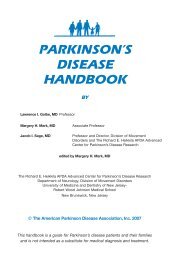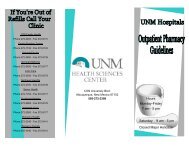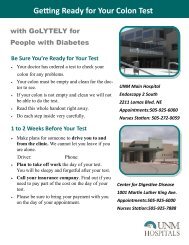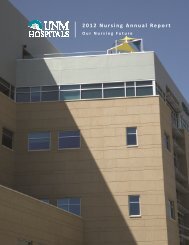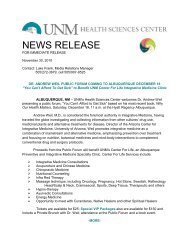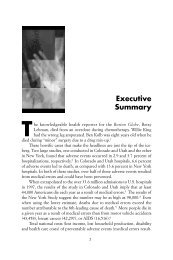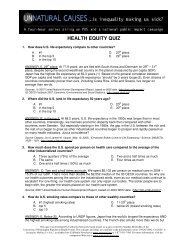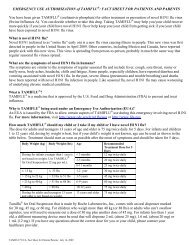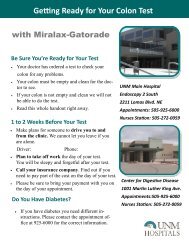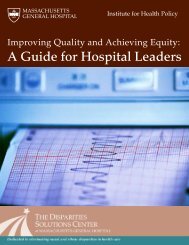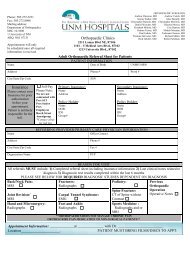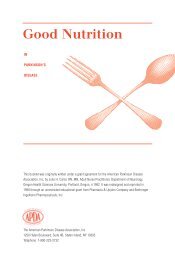Mind Boby Spirit Intregration for Optimum Health - UNM Hospitals
Mind Boby Spirit Intregration for Optimum Health - UNM Hospitals
Mind Boby Spirit Intregration for Optimum Health - UNM Hospitals
You also want an ePaper? Increase the reach of your titles
YUMPU automatically turns print PDFs into web optimized ePapers that Google loves.
Holistic philosophyPreventive & Integrative Medicine is an approach to healthand well-being which:• Brings together conventional medicine with safe andeffective complementary therapies.• Is healing oriented• Takes account of all areas of your life• Focuses on natural or less invasive therapies, with aparticular focus on developing healthy lifestyle habits• Allows you to be an active participant in your health care
Key Concepts:• Integrative Medicine:– Addresses the inter-relationships of thebio-psycho-social-spiritual dimensions ofthe whole person.– Supports and encourages the body’s innateability to heal itself.
Center <strong>for</strong> Life• Center <strong>for</strong> Life offers complementarytherapies that have been proven beneficial intreating Parkinson’s. These include:– Integrative Medicine– Acupuncture– Chiropractic– Advanced Manual Therapy– Ayurveda– Psychotherapy– Energy Medicine
Integrative Medicine• The doctor or nurse practitioner:– Reviews the medical record from your referringdoctor.– Meets with you to assess your medical history, healthhabits, family history, life style and dietary habits.– Recommends complementary therapies that workwith the referring doctor’s treatment plan.– Consults with your referring doctor.
Integrative Medicine• Potential Treatments Include:– Pharmacy grade supplements, herbs, vitamins– Preventive life style changes– Referrals <strong>for</strong> adjunctive therapies such as:• Acupuncture• Chiropractic• Advanced Manual Therapy• Ayurveda• Psychotherapy• Energy Medicine
Vitamins, Herbs, Supplements• The doctor/nurse practitioner may recommend the use ofone or more of the following based upon yourcomprehensive medical history.– 5-HTTP: The precursor <strong>for</strong> serotonin, which is the brain chemicalassociated with sleep, mood, movement, feeding, andnervousness. It helps the brain to regulate body posture andlimb movements.– Zinc: Wilson’s disease is an inherited disorder of coppermetabolism characterized by a failure of the liver to excretecopper, which leads to its accumulation in the liver, brain,cornea, and kidney with resulting chronic degenerative changes.– Arginine: Considered a semi-essential amino acid becausealthough it is normally synthesized in sufficient amounts by thebody, suppementation is sometimes required.
Vitamins, Herbs, Supplements• Ashwagandha: Widely cultivated in India and the MiddleEast <strong>for</strong> its medicine properties.• Chromium: Has been studied <strong>for</strong> its protective benefits inParkinson’s disease and is included in antioxidantmultivitamins.• Coenzyme Q10: Is produced by the human body and isnecessary <strong>for</strong> the basic functioning of cells.• Cowhage: Has been used in traditional Ayurvedicmedicine to treat Parkinson’s disease. Preliminaryevidence suggests that it contains 4% levodopa, thesame chemical used in several Parkinson’s diseasedrugs.
Vitamins, Herbs, Supplements• DHEA: An adrenal supplement <strong>for</strong> myotonic dystrophy.• Ginseng: Patients with neurological disorders mayimprove when taking Asian ginseng.• L-carnitine: Traditionally used <strong>for</strong> support of neurologicalconditions.• Melatonin: A naturally occurring hormone that helpsregulate sleep/wake cycles and has been reported usefulin Parkinson’s.• Moxibustion: Uses the principle of heat to stimulatecirculation and break up congestion or stagnation ofblood.
Vitamins, Herbs, Supplements• Safflower: Decreases deterioration caused by Friedreich’sataxia.• Selenium: An antioxidant that may have clinical benefits inmotor neuron diseases.• Taurine: Affects cellular hyperexcitability by increasingmembrane conductance to potassium and chloride ions.• Vitamin E: Used to manage abnormal involuntarymovements.• All vitamins, herbs, and supplements havecontraindications. Their use should bedetermined by a qualified health practitioner.
Acupuncture & Acupressure• The Doctor of Oriental Medicine will use several differentdiagnostic techniques such as pulse taking on bothwrists, examining your tongue, and palpating variousareas of your body <strong>for</strong> tenderness.• Acupuncture and acupressure help relieve symptoms ofneurological disorders, including cerebral palsy, nervedamage, Parkinson’s, Tourettes and trigeminalneuralgia.
Chiropractic• Chiropractic is a healthcare discipline that focuses on therelationship between musculoskeletal structure (primarilythe spine) and body function (as coordinated by thenervous system) and how this relationship affects thepreservation and restoration of health.• Although there is not enough reliable scientific evidenceto conclude the effects of chiropractic techniques in themanagement of Parkinson’s disease, anecdotal reportssuggest a positive impact on fine muscle coordination.
Advanced Manual Therapy• Early evidence suggests a benefit from massage <strong>for</strong>cerebral palsy, Parkinson’s, and spinal cord injuries.• The Therapist will tailor your treatment according to yourneeds which may include massage, deep tissue,visceral/neuro manipulation or Myofascial therapy. TheAdvanced Manual Therapist may also introduce cranialsacral, lymphatic drainage and active isolated stretchingto help facilitate your physical well being and addressyour chief concerns.
Ayurveda• A <strong>for</strong>m of natural medicine that originated in ancientIndia more than 5,000 years ago.• Aurveda is an integrated system of techniques that usesdiet, herbs, exercise, meditation, yoga, and bodywork toachieve optimal health.• There is evidence that the traditional herbal remedyMucuna Pruriens may improve symptoms in Parkinson’sdisease and that it may offer advantages overconventional L-dopa preparation in the long-termmanagement of the disorder.
Psychotherapy• An interactive process between a client and a qualifiedmental health professional where the client exploresthoughts, feelings, and behaviors to help with problemsolving.• As many as half of the individuals with Parkinson’sdevelop depression. Although physical limitationsresulting from Parkinson’s can be frustrating andstressful, depression in someone with Parkinson’s isn’tusually a reaction to physical disability. Instead, it morelikely arises from underlying brain changes associatedwith the disease itself.
Energy Medicine• Therapeutic touch practitioners hold their hands a shortdistance from the client without actually making physicalcontact.• The purpose of this technique is to detect the client’senergy field, allowing the practitioner to correct anyperceived imbalances.• There is some evidence that therapeutic touch mayaffect some properties of the central nervous system.
Life Style Classes• Proper diet and exercise is very important <strong>for</strong> individuals withmovement disorders, including Parkinson’s. Center <strong>for</strong> Life offersclasses in:– MEAL Classes: Body mass index is associated with a risk ofParkinson’s disease. Losing weight may reduce the chances ofdeveloping Parkinson’s. It is best to avoid stimulants, alcohol, andsmoking and it may be best to eliminate potential food allergensincluding dairy, eggs, nuts, shellfish, wheat, corn, preservatives, andfood additives. A clinical study found a higher risk of Parkinson’samong dairy product consumers in both men and women, suggestingthat dairy products may increase the risk of Parkinson’s.– Qi Gong: A type of traditional Chinese medicine that is thought to be atleast 4,000 years old. It is traditionally used <strong>for</strong> spiritual enlightenment,medical care, and self-defense. There is promising early evidencesuggesting that internal Qi Gong may help in the treatment ofParkinson’s disease.
How to Contact Center <strong>for</strong> Life• This presentation is only in<strong>for</strong>mational.– A customized plan can only be given by a provider at Center <strong>for</strong> Life.• To schedule an appointment at Center <strong>for</strong> Life:– Talk to your primary doctor. <strong>UNM</strong> doctors can refer you thru the electronicmedical record. Non-<strong>UNM</strong> doctors can call 925-7464 to make a referral.• To see more in<strong>for</strong>mation about Center <strong>for</strong> Life:– Visit our website at http://hsc.unm.edu/som/cfl



